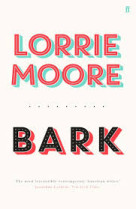The eight stories in Lorrie Moore’s new collection Bark may not have the dazzling urgency of pieces from earlier collections but they do leave traces as if you’ve been bitten. Why?
They broach dark territory with light relief
Moore wades straight in to the mess of human disappointment, disillusionment and dislocation with characters that are world-weary, beset, lonely and spiky.
You will laugh with them and at them. A number of them use humour as a shield, deflecting attention from the uneasiness of their emotional states.
They wrestle with meaning
Moore said in a recent interview that her stories come from trying to wrestle meaning from the little disturbances you have in life.
She also said she spent her childhood watching Sunday afternoon rehearsals of the Glens Falls Operetta Club and that, “Even bad theatre is exciting to me because it’s live people saying really pithy or extraordinary or hilariously dumb things. You just get to sit back and watch. It’s like a dinner party that’s gone wrong, but it’s not your fault.”
In Bark, Moore’s characters face “disturbances” like dating after divorce, how to face the fact that your lover is using your deranged son as an excuse not to get closer, how to negotiate the death of your marriage while on a family holiday, and what your reaction might be if you were seated at dinner next to a woman who’d been maimed by a terrorist attack.
Many of these characters seem unreachable in their distress — as if they’re on stage — which mirrors perfectly their difficulty in finding and sustaining intimate connections.
They’re deftly observed
Moore is a wry observer of American life and crafts vignettes from it deftly.
In “Foes” a writer who has devoted “years of affectionate thought and research” to George Washington is at a D.C. fundraiser. He notes how much he hates Washington city: “An ostentatious company town built on a marsh — a mammoth, pompous, chit-ridden motor vehicle department run by gladiators. High-level clerks on the take, their heads full of unsound sound bites and falsified recall.”
The story “Debarking” begins with Ira, who is a divorcee, falling under the spell of a woman at a party: “Like everyone he knew, he could discern the hollowness in people’s charm only when it was directed at someone other than himself. When it was directed at him, the person just seemed totally nice.”
The characters eyeball mid-life realities …
Many of Bark’s characters have reached middle age and are negotiating the blunt truths, ongoing compromises and relational stresses this involves.
“Living did not mean one joy piled upon another,” says one. “It was merely the hope for less pain.”
Dewy-eyed they are not. Most have faced enough of life for it to have worn down their resilience and depleted their capacity to take risks or endure more. Many grapple with being alone.
“Aloneness was like riding a bike. At gunpoint. With the gun in your own hand. Aloneness was the air in your tires, the wind in your hair. You didn’t have to go looking for it with open arms. With open arms you fell off the bike: I was drinking my wine too quickly.”
… and resignations
Many are willing to settle for second best — knowing that their life choices have now become limited and that the world after 9/11 is insane and hard to bear.
As Ira says, “Especially now with all that’s happening in the world, I can’t live without some intimacy, companionship, whatever you want to call it, to face down this global craziness.”
“You shouldn’t use people as human shields,” his friend, Mike, says at one point. “Or — I don’t know — maybe you should.”
… and compensatory joys
Some characters are happy to see the joy of others and imbibe them as tonic — balancing the deaths they’ve endured among their loved ones and friends.
In “Thank You for Having Me” the main character observes how sanguine, useful and “a little beautiful” it was that an ex-husband seemed happy to be at his wife’s second wedding.
She also muses that, “It seemed spiritually important to go to weddings: to give balance to the wakes and memorial services. People shouldn’t have been set in motion on this planet only to grieve losses. And without weddings there were only funerals.”
They’re stylistically refined
Moore’s voice has always been unique and her precise language can send a dart into the emotional heart of a character’s struggles. Her straight descriptions, too — a takeaway coffee in “its warted brown vest” for example — are impressively exact.
There’s no fat in Moore’s fourth short story collection — but there is a lot of style (and some terrible puns). Be warned though: Bark bites … and trace elements can be found in the bloodstream weeks after reading.




“Trace elements can be found in the bloodstream weeks after reading.”
Indeed. Thank you for yet another marvelous read!